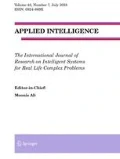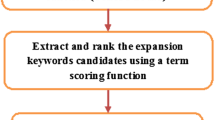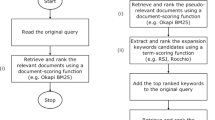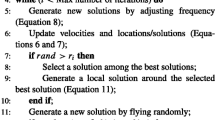Abstract
Swarm intelligence algorithms are now among the most widely used soft computing techniques for optimization and computational intelligence. One recent swarm intelligence algorithm that has begun to receive more attention is Accelerated Particle Swarm Optimization (APSO). It is an enhanced version of PSO with global optimization capability, sufficient simplicity and high flexibility. In this paper, we propose the application of the APSO technique to efficiently solve the problem of Query Expansion (QE) in Web Information Retrieval (IR). Unlike prior studies, we introduce a new modelling of QE that aims to find the suitable expanded query from among a set of expanded query candidates. Nevertheless, due to the large number of potential expanded query candidates, it is extremely complex to produce the best one through conventional hard computing methods. Therefore, we propose to consider the problem of QE as a combinatorial optimization problem and address it with APSO. We thoroughly evaluate the proposed APSO for QE using MEDLINE, the world Web’s largest medical library. We first conduct a preliminary experiment to tune the APSO parameters. Then, we compare the results to a recent swarm intelligence algorithm called Firefly Algorithm (FA). We also compare the results with three recently published methods for QE that involved Particle Swarm Optimization (PSO), Genetic Algorithm (GA) and Bat Algorithm (BA). The experimental analysis demonstrates that the proposed APSO for QE is very competitive and yields substantial improvement over the other methods in terms of retrieval effectiveness and computational complexity.








Similar content being viewed by others
References
Al Kabary I, Schuldt H (2014) Enhancing sketch-based sport video retrieval by suggesting relevant motion paths Proceedings of the 37th International ACM SIGIR Conference on Research and Development in Information Retrieval, pp 1227–1230. ACM
Anand R, Kotov A (2015) An empirical comparison of statistical term association graphs with dbpedia and conceptnet for query expansion Proceedings of the 7th Forum for Information Retrieval Evaluation, pp 27–30. ACM
Bhatnagar P, Pareek N (2015) Genetic algorithm-based query expansion for improved information retrieval Proceedings of the International Conference on Intelligent Computing, Communication and Devices, pp 47–55. Springer
Biancalana C, Gasparetti F, Micarelli A, Sansonetti G (2013) Social semantic query expansion. ACM Trans Intell Syst Technol 4(4):60
Bindal AK, Sanyal S (2012) Query optimization in context of pseudo relevant documents Proceedings of the 3rd Italian Information Retrieval Workshop
Blum C, Roli A (2003) Metaheuristics in combinatorial optimization: Overview and conceptual comparison. ACM Comput Surv 35(3):268–308
Brandao WC (2014) Exploiting entities for query expansion. ACM SIGIR Forum 48(1):43–43
Carpineto C, Romano G (2012) A survey of automatic query expansion in information retrieval. ACM Comput Surv 44(1):1– 50
Curé OC, Maurer H, Shah NH, Le Pendu P (2015) A formal concept analysis and semantic query expansion cooperation to refine health outcomes of interest. BMC Med Inform Decis Mak 15(1):1
El Ghali B, El Qadi A (2016) Context-aware query expansion method using language models and latent semantic analyses. Knowledge and Information Systems, pp 1–12
El Ghali B, El Qadi A, Ouadou M, Aboutajdine D (2015) Context-based query expansion method for short queries using latent semantic analyses Proceedings of the 3rd International Conference on Networked Systems, pp 468–473. Springer
Gandomi AH, Yun GJ, Yang XS, Talatahari S (2013) Chaos-enhanced accelerated particle swarm optimization. Commun Nonlinear Sci Numer Simul 18(2):327–340
Gao J, Xu G, Xu J (2013) Query expansion using path-constrained random walks Proceedings of the 36th International ACM SIGIR Conference on Research and Development in Information Retrieval, pp 563–572. ACM
Geng B, Zhou F, Qu J, Zhang BW, Cui XP, Yin XC (2014) Social book search with pseudo-relevance feedback Proceedings of the 21st International Conference on Neural Information Processing, pp 203–211. Springer
Hafiz F, Abdennour A (2016) Particle swarm algorithm variants for the quadratic assignment problems-a probabilistic learning approach. Expert Syst Appl 44:413–431
Jain A, Mittal K, Tayal DK (2014) Automatically incorporating context meaning for query expansion using graph connectivity measures. Progress in Artificial Intelligence 2(2-3):129–139
Jiji GW, DuraiRaj PJ (2015) Content-based image retrieval techniques for the analysis of dermatological lesions using particle swarm optimization technique. Appl Soft Comput 30:650– 662
Jung JJ (2013) Cross-lingual query expansion in multilingual folksonomies: a case study on flickr. Knowl-Based Syst 42:60–67
Kenndy J, Eberhart R (1995) Particle swarm optimization Proceedings of 1995 IEEE International Conference on Neural Networks, pp 1942–1948
Khennak I, Drias H (2016) Bat algorithm for efficient query expansion: Application to medline Proceedings of the 4th World Conference on Information Systems and Technologies, pp 113–122. Springer
Khennak I, Drias H (2016) A firefly algorithm-based approach for pseudo-relevance feedback: Application to medical database. J Med Syst 40(11):240
Leturia I, Gurrutxaga A, Areta N, Alegria I, Ezeiza A (2013) Morphological query expansion and language-filtering words for improving basque web retrieval. Lang Resour Eval 47(2):425– 448
Leung CH, Li Y, Milani A, Franzoni V (2013) Collective evolutionary concept distance based query expansion for effective web document retrieval Proceedings of the 13th International Conference on Computational Science and its Applications, pp 657–672. Springer
Li Q, Tian M, Liu J, Sun J (2016) An implicit relevance feedback method for cbir with real-time eye tracking. Multi Tools Appl 75(5):2595–2611
Li R, Hao L, Zhao X, Zhang P, Song D, Hou Y (2015) A query expansion approach using entity distribution based on markov random fields Proceedings of the 11th Asia Information Retrieval Societies Conference, pp 387–393. Springer
Ling SH, Chan KY, Leung FHF, Jiang F, Nguyen H (2016) Quality and robustness improvement for real world industrial systems using a fuzzy particle swarm optimization. Eng Appl Artif Intell 47:68–80
Lv C, Qiang R, Fan F, Yang J (2015) Knowledge-based query expansion in real-time microblog search Proceedings of the 11th Asia Information Retrieval Societies Conference, pp 43–55. Springer
Miyanishi T, Seki K, Uehara K (2013) Improving pseudo-relevance feedback via tweet selection Proceedings of the 22nd ACM International Conference on Information and Knowledge Management, pp 439–448. ACM
Moradi P, Gholampour M (2016) A hybrid particle swarm optimization for feature subset selection by integrating a novel local search strategy. Appl Soft Comput 43:117–130
Oh HS, Jung Y (2015) Cluster-based query expansion using external collections in medical information retrieval. J Biomed Inform 58:70–79
Park JH, Croft WB (2015) Using key concepts in a translation model for retrieval Proceedings of the 38th International ACM SIGIR Conference on Research and Development in Information Retrieval, pp 927–930. ACM
Ren C, An N, Wang J, Li L, Hu B, Shang D (2014) Optimal parameters selection for bp neural network based on particle swarm optimization: A case study of wind speed forecasting. Knowl-Based Syst 56:226–239
Robertson S, Zaragoza H (2009) The probabilistic relevance framework: Bm25 and beyond. Found Trends Inf Retr 3(4):333–389
Robertson SE, Jones KS (1976) Relevance weighting of search terms. J Am Soc Inf Sci 27(3):129–146
Robertson SE, Walker S, Beaulieu M, Gatford M, Payne A (1995) Okapi at trec-4 Proceedings of the 4th Text Retrieval Conference, pp 73–97
Rocchio JJ (1971) Relevance feedback in information retrieval. The SMART Retrieval System - Experiments in Automatic Document Processing, pp 313–323
Salehi S, Selamat A, Mashinchi MR, Fujita H (2015) The synergistic combination of particle swarm optimization and fuzzy sets to design granular classifier. Knowl-Based Syst 76:200–218
Saraiva PC, Cavalcanti JM, de Moura ES, Gonċalves M.A., Torres RDS (2016) A multimodal query expansion based on genetic programming for visually-oriented e-commerce applications. Inf Process Manag 52 (5):783–800
Sarwar SM, Abedin MA, Ullah A, Al Mamun A (2013) Personalized query expansion for web search using social keywords Proceedings of the 15th International Conference on Information Integration and Web-Based Applications and Services, p 610. ACM
Singh J, Sharan A (2015) Context window based co-occurrence approach for improving feedback based query expansion in information retrieval. Int J Inf Retr Res 5(4):31–45
Singh J, Sharan A (2016) A new fuzzy logic-based query expansion model for efficient information retrieval using relevance feedback approach. Neural Computing and Applications, pp 1–24
Yang XS (2008) Nature-Inspired Metaheuristic Algorithms. Luniver Press
Yang XS (2010) Engineering Optimization: an Introduction with Metaheuristic Applications. John Wiley & Sons
Yang XS (2010) A new metaheuristic bat-inspired algorithm Nature Inspired Cooperative Strategies for Optimization, pp 65–74
Yang XS (2014) Nature-Inspired Optimization Algorithms. Elsevier
Ye Z, Huang JX (2014) A simple term frequency transformation model for effective pseudo relevance feedback Proceedings of the 37th International ACM SIGIR Conference on Research and Development in Information Retrieval, pp 323–332. ACM
Zhang R, Song S, Wu C (2012) A two-stage hybrid particle swarm optimization algorithm for the stochastic job shop scheduling problem. Knowl-Based Syst 27:393–406
Zhou D, Lawless S, Wade V (2012) Improving search via personalized query expansion using social media. Inf Retr 15(3-4):218–242
Author information
Authors and Affiliations
Corresponding author
Rights and permissions
About this article
Cite this article
Khennak, I., Drias, H. An accelerated PSO for query expansion in web information retrieval: application to medical dataset. Appl Intell 47, 793–808 (2017). https://doi.org/10.1007/s10489-017-0924-1
Published:
Issue Date:
DOI: https://doi.org/10.1007/s10489-017-0924-1




